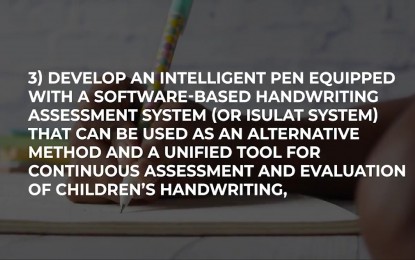
(Screenshot from DOST-5 Facebook page)
MANILA – The Philippine Council for Health Research and Development (PCHRD) has allocated over PHP3.2 million funding for a project that aims to develop a tool that could assess the handwriting of children.
"There is much information that can be gathered from the simple pencil grasp, speed and legibility of handwriting; and even different stroke patterns. The proposed solution is to gather these available data from handwriting stroke patterns and (get the) distinct features using a specialized smartpen," Department of Science and Technology (DOST) Secretary Fortunato de la Peña said in a taped report aired Friday afternoon.
The project called i-SULAT (Intelligent Stroke Utilization, Learning, Assessment, and Testing) aims to create a system and unified handwriting tool that could help solve the problems of inter-tool scoring variations, inconsistency, incongruence, and assessment time, according to de la Peña.
This is headed by Edison Roxas of the Electronics Engineering Department of the University of Santo Tomas, and will run from April 2022 to June 2024.
Roxas' project will define a reference normative database of Filipino school-aged children handwriting using the traditional tools: test of visual-motor skills (TVMS), Minnesota handwriting assessment (MHA), and evaluation tool of children’s handwriting (ETCH) which can be used to assess and evaluate handwriting with or without impairments.
It will also determine significant handwriting parameters for a quantitative assessment of children’s handwriting, and develop a smart pen equipped with a software-based iSULAT system.
De la Peña said the proposed iSULAT system is capable of getting distinct features through different handwriting stroke patterns for continuous analysis, evaluation of children’s handwriting.
"The children’s handwriting database from the project can be used as a reference for future studies and further analysis involving handwriting assessment of individuals having different medical, neurological, and psychological conditions such as stroke, Parkinson’s disease, attention- deficit hyperactivity disorder (ADHD), dyslexia, and even early onset of depression," he said.
The DOST chief said the failure to attain handwriting competency during the school-age year results in negative effects on both academic success and self-esteem. (PNA)
"There is much information that can be gathered from the simple pencil grasp, speed and legibility of handwriting; and even different stroke patterns. The proposed solution is to gather these available data from handwriting stroke patterns and (get the) distinct features using a specialized smartpen," Department of Science and Technology (DOST) Secretary Fortunato de la Peña said in a taped report aired Friday afternoon.
The project called i-SULAT (Intelligent Stroke Utilization, Learning, Assessment, and Testing) aims to create a system and unified handwriting tool that could help solve the problems of inter-tool scoring variations, inconsistency, incongruence, and assessment time, according to de la Peña.
This is headed by Edison Roxas of the Electronics Engineering Department of the University of Santo Tomas, and will run from April 2022 to June 2024.
Roxas' project will define a reference normative database of Filipino school-aged children handwriting using the traditional tools: test of visual-motor skills (TVMS), Minnesota handwriting assessment (MHA), and evaluation tool of children’s handwriting (ETCH) which can be used to assess and evaluate handwriting with or without impairments.
It will also determine significant handwriting parameters for a quantitative assessment of children’s handwriting, and develop a smart pen equipped with a software-based iSULAT system.
De la Peña said the proposed iSULAT system is capable of getting distinct features through different handwriting stroke patterns for continuous analysis, evaluation of children’s handwriting.
"The children’s handwriting database from the project can be used as a reference for future studies and further analysis involving handwriting assessment of individuals having different medical, neurological, and psychological conditions such as stroke, Parkinson’s disease, attention- deficit hyperactivity disorder (ADHD), dyslexia, and even early onset of depression," he said.
The DOST chief said the failure to attain handwriting competency during the school-age year results in negative effects on both academic success and self-esteem. (PNA)
